Servicios Personalizados
Articulo
Indicadores
Links relacionados
-
 Citado por Google
Citado por Google -
 Similares en Google
Similares en Google
Compartir
Psychology in Society
versión On-line ISSN 2309-8708
versión impresa ISSN 1015-6046
PINS no.65 Stellenbosch 2023
http://dx.doi.org/10.57157/pins2023vols5iss1a5816
ARTICLES
Psychological barriers to climate-friendly food choices
Elzarie TheronI; Sean HagenII
IDepartment of Psychology, University of South Africa. elzarietheron@gmail.com. 0000-0002-6558-2887
IIDepartment of Psychology, University of South Africa
ABSTRACT
The food supply chain is a significant contributor to climate change. By following a climate-friendly diet, consumers have the potential to significantly reduce the effects of climate change. However, despite the growing awareness of the climate-friendly food options that are available, consumers still choose foods with a high carbon footprint. Following a survey design, this study aimed to determine the extent to which four psychological processes (denial, conflicting goals and aspirations, tokenism, and interpersonal influence) limited climate-friendly food choices in a sample of adult consumers residing in Gauteng, South Africa. Data were collected from 146 participants using the Climate-friendly Food Choices Scale and the Psychological Barriers Scale. Results indicated that, overall, the barriers were negatively associated with climate-friendly food choices. Regression analysis indicated that the four psychological barriers explained 10.S % of the variance in climate-friendly food choices. Conflicting goals and aspirations and denial were identified as the two main psychological barriers to climate-friendly food choices. It is therefore essential to consider the psychological processes that could have a limiting effect on the adoption of climate-friendly food choices in our approach to encourage pro-environmental change.
Keywords: Consumer behaviour, climate change mitigation, climate-friendly food, pro-environmental behaviour, psychological processes, sustainable food choices
Introduction
The food supply chain is a significant contributor to anthropogenic climate change (Poore & Nemecek, 2018). The processes involved in the production of certain foods, the distribution, and the disposal of food; all contribute significantly to climate change. Furthermore, the effects of climate change interrupt the production of food, which results in less available food to feed a growing population (Wheeler & von Braun, 2013).
Over the last 12 years, the world population has grown by approximately 1 billion people at a rate of around 1.10% per year (83 million people per year) (United Nations, Department of Economic and Social Affairs, 2017). The World Wide Fund for Nature (WWF, 2017) has estimated that, should food production processes and consumption habits remain the same, a 70% increase in food production would be necessary to feed the growing population by 2050.
While the agricultural sector has adopted various conservation processes to reduce the environmental impact of food production, it is imperative that consumers reduce their demand for foods that are environmentally taxing. As with many other industries, the agricultural sector operates on the principles of supply and demand, and therefore if the demand for certain types of foods reduces, a decrease in the production of these foods can be expected (Jankielsohn, 2015).
Climate-friendly food choices (CFFC) refer to the decisions that consumers make with the intention of reducing the impact of their food consumption practices on the environment. This includes choosing food products that have a lower carbon footprint from agricultural production to consumption and monitoring food waste in order to reduce greenhouse gas (GHG) emissions (Freudberg & Buck, 2012). A climate-friendly diet includes more plant and fewer animal-based foods, purchasing locally and organically grown foods, and minimising food waste (Åström et al., 2013). A shift towards a more climate-friendly diet can have a significant impact on mitigating climate change. For example, in the European Union (EU) a 50% reduction in the consumption of meat, dairy, and eggs could achieve a 40% decline in nitrogen emissions, 25 to 40% reduction in GHG-emissions, and 23% per capita less land use for crop production (Westhoek et al., 2014). However, despite the positive impact that a shift to a climate-friendly diet could have on the environment, a large proportion of consumers in South Africa, who appear to have the privilege to make CFFC, still seem reluctant to change their food choices.
Internationally, research has sought to address this issue by considering the motivators, values, attitudes, and contextual barriers (e.g., cost and availability) that influence food choices. Several studies have considered the economic (Wang et al., 2014; Yadav & Pathak, 2016), personal (Hartikainen et al., 2014; Schösler et al., 2014), and social determinants (Pohjolainen et al., 2015; Puska et al., 2018) that motivate food choices. Other studies have investigated the impact of hedonistic motivators (Graça et al., 2015; Hartikainen et al., 2014; Kourouniotis et al., 2016; Pohjolainen et al., 2015), the convenience with which a product can be prepared (Vainio et al., 2016; Yadav & Pathak, 2016), the perceived healthiness of a product (Hartikainen et al., 2014; Schösler et al., 2014) and pro-environmental self-identity (Albani et al., 2018; Carfora et al., 2017; Haverstock & Forgays, 2012).
However, while many determinants of pro-environmental behaviour (PEB) have been identified, to date, no single framework has been introduced that successfully predicts PEB (see Ding et al., 2018; Kollmuss & Agyeman, 2002). Furthermore, behavioural interventions that focus on the determinants of PEB have only been relatively effective in promoting CFFC (Taufik et al., 2019). While Kollmuss and Agyeman (2002) suggest that the problem with a framework that includes all the determinants would be that it is too complex to apply and understand, Gaspar, Palma-Oliveira, & Corral-Verdugo (2010) argue that the failure to predict PEB is rather due to an overestimation of the predictive value of determinants and a disregard of the barriers that limit PEB, as well as a lack of psychological explanations, and an underestimation of the influence of unconscious processes.
Therefore, moving beyond the descriptive and predictive frameworks that are often applied to predict PEB, such as the Value-Belief-Norm Theory (Stern 2000; Stern et al. 1999), The Theory of Reasoned Action (Fishbein & Ajzen, 1975) and The Theory of Planned Behaviour (Ajzen, 1991); to explain how psychological, non-psychological, conscious, and unconscious processes interact to constrict or prohibit PEB; Gaspar (2013) suggested a Process Model of Psycho-social Barriers and Constraints, based on an adaptation of the DN-Work model ("Didn't-work") (Gaspar et al., 2010).
The process model considers that every individual with their dispositional characteristics (motivations, values, attitudes, traits, worldviews) functions within a context that has situational characteristics (non-psychological and psychological) (Gaspar, 2013). Non-psychological situational characteristics include the physical world (e.g., the built environment) and the non-physical world (e.g., economic and socio-demographic factors); and psychological situational characteristics refer to an individual's interpretation of their situational context.
The model suggests that it is the interaction between individual and situational characteristics, guided by various psychological processes (motivational and cognitive), that create conditions that limit PEB or facilitate anti-PEB (Gaspar, 2013). These psychological processes influence how an individual collects, analyses, and interprets information to derive meaning in the world. Motivational processes are guided by a need to understand and predict the environment, a need for social connectedness and support, and a need to be perceived in a positive way by others (Gaspar, 2013). Cognitive processes are also guided by three principles: First, people are conservative, that is, they are slow to change their views and their behaviours. Second, they use the information that is most accessible to them to guide their thoughts, emotions, and behaviours; and third, despite people's capability to systematically work through information, they often approach situations in a superficial way that require low effort (heuristic processing) (Gaspar, 2013).
Internationally, there is a dearth of research investigating the psychological processes that limit CFFC (Graves & Roelich, 2021). In South Africa, most studies have focussed on the biophysical, financial, and knowledge barriers experienced in agricultural production and rural development (Shackleton et al., 2015) whilst largely ignoring the psychological processes that limit the consumer's climate change mitigative behaviour.
While investigating the relevance of several psychological barriers specific to the food context, Gifford & Chen (2017) identified four psychological processes that limit CFFC intentions. These processes were: Conflicting goals and aspirations, Denial, Interpersonal influence, and Tokenism. The first process, conflicting goals and aspirations, refers to investments made by an individual (of time, effort or money) that are not aligned with climate change mitigative and adaptive behaviour. The fear of losing an already-made investment, should the behaviour be changed, may influence the individual's decision to adopt the new behaviour. The second process, denial, refers to a general disbelief in climate change or in our ability to slow it down; such scepticism about the necessity to adopt mitigative behaviour could reduce an individual's willingness to do so as any action is likely to be seen as unnecessary. The third process, interpersonal influence, refers to social pressures that often compel people to act in a certain way. If social pressures contradict climate-friendly behaviour, this could deter an individual from adopting the behaviour. Lastly, tokenism refers to behaviour that has already been adopted that prevents additional, more impactful behaviour. An individual might feel that the behaviour that they have already adopted, for example recycling, is sufficient and may regard any additional mitigative behaviour as unnecessary, regardless of its impact.
It is conceivable that the psychological barriers, as experienced by individuals residing in South Africa, differ from individuals living elsewhere in the world. This could be explained by the differences that occur because perceptions, knowledge, experiences, and socialisation practices that influence barrier perceptions (Pohjolainen et al., 2015) differ from culture to culture (Ruby et al., 2013). These experiences are, in part, influenced by cultural processes, media messages and depictions of climate change, and formal and informal discourses about climate change (Clayton et al., 2009).
Notwithstanding the importance of economic, personal, and social factors that influence CFFC, it is essential to develop an understanding of the psychological processes that limit these choices, sometimes beyond our awareness (Mäkiniemi & Vainio, 2014). An understanding of these processes can enable us to control for their impact when developing communication campaigns and intervention strategies aimed at promoting CFFC and other PEB.
This study therefore takes a first look at the influence of several psychological barriers to CFFC in a South African context.
Method
This cross-sectional study followed a survey design, using an online questionnaire as the data collection instrument.
Participants
The study population included adults (18 years or older) in Gauteng who have access to the Internet. The sample was drawn by means of convenience sampling, using Facebook as the initial sampling frame. The invitation was shared on an open group for psychology students affiliated with the University of South Africa and individual invitations were sent to the researcher's Facebook contact list using Facebook Messenger. Prospective participants were asked to share the invitation with three friends, using Facebook, WhatsApp, Email, or Short Message Service. The balance of the participants was thus accessed by means of referral sampling.
Both sampling techniques are vulnerable to sampling bias, because of subject self-selection, and could result in certain groups of the population being excluded from, or underrepresented, in the study. It should be noted that, while Gauteng has an Internet penetration of 55% (World Wide Works & Dark Fibre Africa, 2017)-that is, every second person has access to the Internet - the sample predominantly consisted of middle to high income adult consumers.
A total of 146 completed surveys were included in the analysis. Just over half (51.4%, n = 75) of the participants were female. Approximately half (49.3%, n = 72) of the participants were Millennials (born between 1983 and 1995), 39% (n = 57) were Generation X (born between 1966 and 1982), and 11.6% (n = 17) were Baby Boomers (born between 1940 and 1965). Just under half of the participants were married (47.9%, n = 70). A total of 26.7% (n = 39) were single - never married, and 15.8% were single, but cohabitating with a significant other. Frequencies and percentages are reported in Table 1 (below).
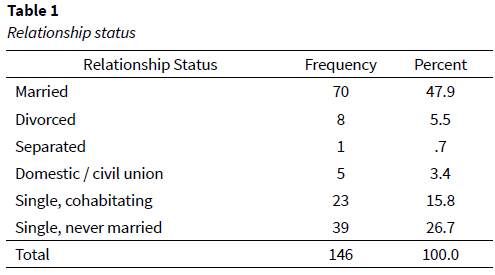
Approximately a third of the participants indicated that they had obtained a BA degree or an advanced certificate (28.1%, n = 41). A total of 24% (n = 35) had obtained an honours degree or a postgraduate diploma, and 18.5% (n = 27) had a master's degree. Frequencies and percentages are reported in Table 2 (below).
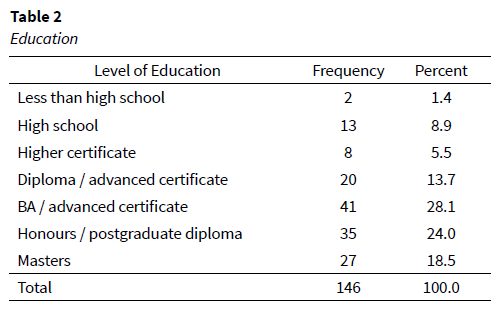
A third of the participants indicated a household income between R378,001 and R783,000 per year (31.5%, n = 46); 2.1% of the sample earned below 11,601 per year per household (n = 3), and 6.8% earned R1,693,001 or more per year per household (n = 10). Frequencies and percentages are reported in Table 3 (below).
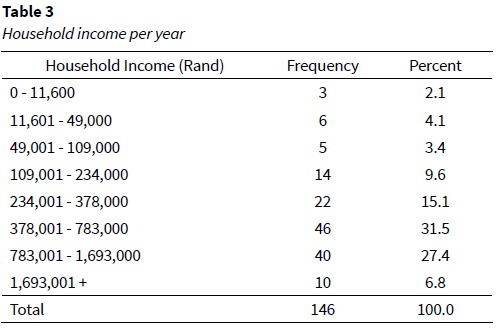
Instruments
Respondents answered a 30-item questionnaire consisting of three sections: 1) biographical data, 2) CFFC, and 3) psychological barriers to CFFC. Information about climate change, CFFC, and making food choices with the intention to reduce climate change was provided in the survey.
CFFC was measured using a 6-item scale developed by Mäkiniemi and Vainio (2013). The scale measured how often people made food choices with the intention to mitigate climate change and included the following items: "I try to select foods that have as small a negative climate effect as possible", "I favour local food", "I avoid the use of imported food products transported by air", "I eat seasonal food", "I limit the consumption of meat and dairy products", and "I try to limit food waste". One continuous score between 6 and 42 was calculated per participant with a high score indicating that the participant more often made food choices with the intention to mitigate climate change than those with a low score. Mäkiniemi and Vainio (2013) reported a reliability coefficient of .90 for the scale. The scale had a Cronbach α-value of .703 in the current study.
Psychological barriers to CFFC were measured using a validated scale developed by Gifford and Chen (2017). The scale consists of 17 items, arranged into four psychological barrier categories, namely denial, conflicting goals and aspirations, tokenism, and interpersonal influence. To develop the model, a principal component analysis, with parallel analysis and Velicer's minimum average partial test was performed. Three, four, and five factor solutions were examined. Items that loaded below 0.5 and that appeared low in construct validity were deleted. The barrier items most meaningfully loaded on a four-factor solution. The first factor (denial) explained 36% of the variance, followed by 6% (conflicting goals and aspirations), 4% (tokenism), and 3% (interpersonal influence). Cumulatively the four-factor model explained 49% of the variance. Gifford and Chen (2017) reported Cronbach reliability coefficients for each factor as follows: denial .89, conflicting goals and aspirations .82, tokenism .74 and interpersonal influence .66. In the current study, the composite Psychological Barriers Scale had a Cronbach α-value of .82, and the α-values for the four factors were as follows: conflicting goals and aspirations was .73, denial was .82, tokenism was .69, and interpersonal influence was .53.
The scale measured the extent to which the psychological barriers limited respondents' CFFC and included items such as: "Humankind cannot make a difference when it comes to saving the earth, so there is no point for me to change" and "I'm satisfied with my current way of doing things". A composite, continuous score was calculated as well as a continuous score per barrier category. The possible range of scores was between 17 and 85 for the overall barrier score; between 5 and 25 for denial, conflicting goals and aspirations, and tokenism, and between 2 and 10 for interpersonal influence. None of the items were reversed scored.
Procedure
The study invitation included a link to an external website, which was created using Wix. com, Ltd. (Tel Aviv, Israel). The website contained details about the study, the researcher, inclusion requirements, and consent. Individuals who were interested in completing the survey could proceed to the survey by clicking on the "continue to survey" button that was placed at the bottom of the landing page. The online survey was placed on Survey Monkey Inc. (California, United States). The prospective participants were informed that by clicking to continue to the survey they provided consent to take part in the research.
Data analysis
The data were analysed using the IBM SPSS Statistical software, version 25. To predict the influence of the psychological barriers on CFFC, a multiple linear regression analysis was conducted. A Spearman's correlation analysis was conducted to assess the relationship between psychological barriers and CFFC. Group differences were also analysed.
Ethical considerations
The research was reviewed and approved by the Ethics Committee of the department of Psychology at the University of South Africa, Ref. No: PERC-17034. There were no foreseeable risks for participants in the study. Consent was obtained prior to data collection. No identifying or personal details were captured in the survey and results were discussed as a collective rather than individually, thus ensuring participants' anonymity.
Results
Participants reported that they were most likely to limit their food waste (M=6.23, SD=1.448), favour local food (M=5.75, SD=1.499) and choose to eat seasonal food (M=5.60, SD=1.412). They were, however, less likely to avoid imported food products transported by air (M=3.53, SD=2.419), limit their consumption of meat and dairy (M=2.42, SD=2.316), and select foods based on their climate impact (M=3.38, SD=2.144). Frequencies and percentages reported in Table 4 below.
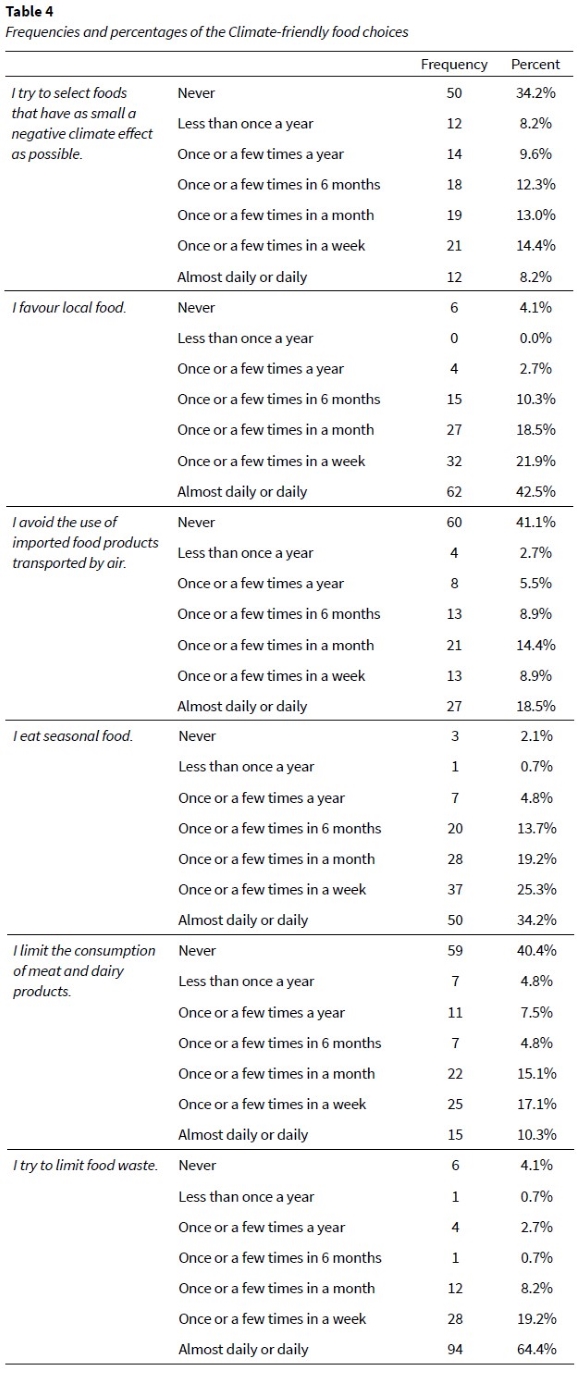
On average, participants reported low levels of psychological barriers (M=27.19, SD=7.311). The barrier statement with the highest score (M = 3.27, SD = 1.060) was a measure of Tokenism and reflected a sense of satisfaction with the current way of doing things. Means and standard deviations are reported in Table 5 below.

Results indicated that there was no significant difference between males and females with regards to the extent to which they experienced psychological barriers to CFFC or the frequency with which they made CFFC. There was also no significant difference between the three age groups with regards to how often they made CFFC. A Kruskal-Wallis H test, however, indicated a statistically significant difference between the different age groups with regards to the extent to which they experienced the psychological barriers to CFFC, H(2) = 6.843, p = .033. Pairwise comparisons of age groups with a Bonferonni correction for multiple comparisons indicated that there was a statistically significant difference between Millennials (Mdn = 33.5) and Generation X (Mdn = 38), adjusted p = .027. The effect size, based on Cohen's (1992) index, was near medium (f = 0.216), with a power of .63. Median and standard deviations are reported in Table 6 below.
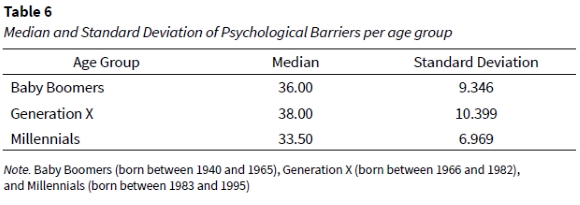
There was a significant, near medium relationship between psychological barriers and CFFC (rs = -.262, N = 146, p = .001) with a power of .80 based on Cohen's (1992) conventions. According to Cohen's conventions an r value, as a measure of effect size, of .10 is small, .30 is medium, and .50 is large.
Results indicated that the four psychological barriers explained 10.6 % of the variance in CFFC, R2 = .130, adjusted R2 = .106, F (4, 141) = 5.284, p = .001. The effect size, based on Cohen's (1992) index was medium (f 2 = .12) and the test had a power of .92. Denial significantly predicted climate-friendly food choices, as did conflicting goals and aspirations, and interpersonal influence. Tokenism did not significantly predict CFFC. Regression coefficients and standard errors are reported in Table 7 (below).
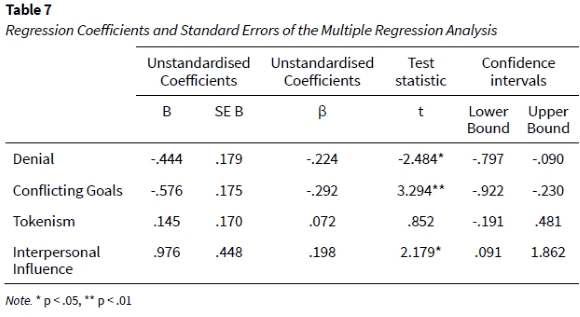
Discussion
By conducting a survey, we aimed to determine the extent to which four psychological processes (denial, conflicting goals and aspirations, tokenism, and interpersonal influence) limited CFFC in a South African sample. This study produced results that are comparable with that of Gifford and Chen (2017). In both studies, conflicting goals and aspirations, and denial emerged as the two main psychological barriers, indicating that these two psychological processes have a strong influence on CFFC across cultures.
These results show that certain psychological processes, such as those proposed by Gifford and Chen (2017), limit CFFC. Furthermore, in line with the Process Model of Psycho-Social Barriers and Constraints, the results indicate a need to move beyond the predictive frameworks of PEB, such as the V-B-N Theory (Stern et al., 1999) and the TPB (Ajzen, 1991) to also consider the psychological processes that can act as barriers to CFFC. An understanding of the psychological processes that limit CFFC could help us prepare for and limit their impact.
While the factors that influence conflicting goals and aspirations and denial require further exploration, we allude to possible explanations for the results.
South Africa has a prominent meat-eating culture that is often associated with several traditions and cultural practices. Furthermore, in South Africa, household wealth increased from 2016 to 2017 (van Tonder et al., 2017), around the time data for this study were collected. Pohjolainen et al. (2015) investigated the barriers experienced by consumers to reduce their meat intake and follow a more plant-based diet. They found that the extent to which people valued social justice, tradition, and wealth, influenced their barrier perceptions. Participants were asked to rate how much they valued various social justice values (e.g., individual freedom, environmental protection, and rights for sexual minorities), tradition (e.g., freedom from oppression, environmental protection, and LGBTQI+ rights), and wealth (e.g., high income and high social status). Results indicated that consumers who valued social justice did not experience barriers to reduce their meat consumption as intensely as individuals who valued tradition and wealth. In other words, individuals who placed a high value on, for example, protecting the environment, experienced less frustration to reduce their meat intake than those who valued, for example, a home culture in which meat consumption plays an important role.
It is therefore not surprising that participants in this study were more likely to limit their food waste and consume local and seasonal food, than they were to reduce their meat consumption. A reduction in meat consumption could require a change in behaviour in which participants may have much invested, and that is situated within traditions and culture. Such a change in behaviour could therefore require a change in the culturally shared meaning of meat, for example, as the centrepiece of a meal (Niva et al., 2017), thus aligning that which is culturally valued with climate-friendly behaviour.
However, the loss of an investment (of time, money or effort) towards a goal is often reason enough for a person to remain with their existing choices. This can be explained by the tendency to perceive sure losses as more significant than possible gains (Kahneman & Tversky, 1979) and the tendency to be risk averse (Kahneman & Tversky, 1982). That is, people often choose to maintain the status quo (Samuelson & Zeckhauser, 1988) instead of adopting new behaviours.
The second process, denial, could be explained as a consequence of ignorance. It seems obvious that a person would be reluctant to change their behaviour towards a cause of which they have little knowledge or do not believe is an issue that requires action. Further research is necessary to determine how much South Africans currently know about climate change and the effects of their food choices on climate change. However, previous research has indicated that a lack of knowledge would result in a lack of motivation to act due to a disbelief in the issue of climate change (Neville, 2010). Similarly, in a UK study by Lorenzoni, Nicholson-Cole, and Whitmarsh (2007), that explored the barriers with regards to engaging with climate change, one participant noted that: "I would be doing more things to prevent this, and I would be speaking more about it [climate change] if I could get some clarity on it. The cause and effect of it all" (p 450). It therefore seems that people are hesitant to invest in mitigative behaviours if they do not have the necessary knowledge about climate change, if they do not believe that it requires attention, or that their investment would make a difference.
Denial could also be a defence mechanism used to reduce cognitive dissonance - the misalignment between a person's beliefs, attitudes, or behaviours that often result in an uncomfortable psychological state of mind (Festinger, 1957). Should such a situation arise, the individual will often attempt to modify one of the three (i.e. beliefs, attitudes, behaviours) in order to reduce the discrepancy and thus reduce the discomfort. Attempts to reduce the discrepancy can take many forms. Šedová, Slovák, and Ježková (2016) identified various defence mechanisms that were used by a sample of students who were aware of the environmental impact of their food choices. Amongst other things, students concealed from themselves or repressed information that contradicted their behaviour, that is they used denial. Denial can therefore be a response to the misalignment between a person's goals and aspirations and their behaviour.
It is therefore plausible that the valuation of meat-eating traditions and a growing emphasis on wealth and status in South African households conflict with CFFC as it produces fear over losing valued goals and aspirations that results in the concealment or repression of climate change information.
Limitations
Limitations of the study were that due to the non-random selection of participants, which is vulnerable to selection bias, the representativeness of the sample was not assumed, and the findings cannot be generalised to the greater South African population. The self-selected sample resulted in a possible middle to high income bias in the study. It should be noted, however, that participation speaks to a willingness to engage in this topic - which could be due to the privilege that enables this income group to consider different food choices depending on their impact on the environment. It should be reflected upon that in low- to middle-income countries, such as South Africa, it is conceivable that factors such as food scarcity and poverty often mean consumption is driven by survival and motivated by availability and affordability rather than by a food product's climate change impact. In which case, it can be said that communication strategies aimed towards the promotion of CFFC should be designed with higher income groups in mind.
Furthermore, while the sample is described in terms of several socio-economic factors, we acknowledge that other elements of culture, such as religion and language could have affected psychological barriers to CFFC. We therefore suggest including elements of culture in future research.
It is suggested that future research should attempt to replicate the study in other regions of South Africa as well as in lower income groups of the population. Future research should also focus on the current level of knowledge that people have about CFFC. Information about the association between knowledge about this topic and food choices could prove insightful.
Conclusion
Results confirm that CFFC are limited by psychological processes. It is therefore important to move beyond the predictive frameworks of PEB to include a consideration of the psychological processes that act as barriers to PEB. In South Africa, Conflicting goals and aspirations and Denial were found to be the strongest predictors of CFFC in a sample of primarily middle to high income consumers. Results were comparable with that of a previous study conducted amongst Canadian community members, suggesting that these two processes may influence consumers' CFFC across cultures. It is important to be cognisant of the fact that South Africa is multicultural and many still face food insecurity. However, as we address these challenges it is important to have an understanding of the various psychological processes that influence food choices and to include directed community-focused interventions and education campaigns collaboratively with communities to understand and address reasons for non-climate friendly food choices. Additionally, the importance of pro-environmental consumerism of South Africans should not be underestimated when developing climate policy.
References
Ajzen, I. (1991). The Theory of Planned Behavior. Organizational Behavior and Human Decision Processes, 50, 179-211. [ Links ]
Albani, V., Butler, L., Traill, W. B., & Kennedy, O. B. (2018). Understanding fruit and vegetable consumption in children and adolescents. The contributions of affect, self-concept and habit strength. Appetite, 120, 398-408. https://doi.org/10.1016/j.appet.2017.09.018 [ Links ]
Åström, S., Roth, S., Wranne, J., Jelse, K., & Lindblad, M. (2013). Food consumption choices and climate change. In IVL report B (Issue April). http://www.entwined.ivl.se/download/18.3d71f8313d6a4ffc7926ad/1365762685 175/Food+Consumption+Choices+and+Climate+Change+-+the+Issue+Brief.pdf [ Links ]
Carfora, V., Caso, D., Sparks, P., & Conner, M. (2017). Moderating effects of pro-environmental self-identity on pro-environmental intentions and behaviour: A multi-behaviour study. Journal of Environmental Psychology, 53, 92-99. https://doi.org/10.1016/j.jenvp.2017.07.001 [ Links ]
Clayton, S., Howard, G., Swim, J., Doherty, T., Gifford, R., Reser, J., Stern, P., & Weber, E. (2009). Psychology and Global Climate Change (Vol. 403, Issue 1). https://doi.org/10.1534/genetics.108.097469 [ Links ]
Cohen, J. (1992). A Power Primer. Psychological Bulletin, 112(1), 155-159. https://doi.org/10.1038/141613a0 [ Links ]
Ding, Z., Jiang, X., Liu, Z., Long, R., Xu, Z., & Cao, Q. (2018). Factors affecting low-carbon consumption behavior of urban residents: A comprehensive review. Resources, Conservation and Recycling, 132(January), 3-15. https://doi.org/10.1016/j.resconrec.2018.01.013 [ Links ]
Festinger, L. (1957). A Theory of Cognitive Dissonance. Stanford University Press. [ Links ]
Fishbein, M., & Ajzen, I. (1975). Belief, attitude, intention and behavior : An introduction to theory and research. Addison-Wesley. [ Links ]
Freudberg, D., & Buck, T. (2012). Climate Friendly Food Guide. [ Links ]
Gaspar, R. (2013). Understanding the Reasons for Behavioral Failure: A Process View of Psychosocial Barriers and Constraints to Pro-Ecological Behavior. Sustainability, 5, 2960-2975. https://doi.org/10.3390/su5072960 [ Links ]
Gaspar, R., Palma-Oliveira, J., & Corral-Verdugo, V. (2010). Why do people fail to act? Situational barriers and constraints on ecological behavior. In V. Corral-Verdugo, C. Garcia-Cadena, & M. Frias-Armeta (Eds.), Psychological Approaches to Sustainability: Current Trends in Research, Theory and Practice (Issue November 2015, pp. 269-294). Nova Science Publishers. https://doi.org/10.1371/journal.pone.0024938 [ Links ]
Gifford, R., & Chen, A. (2017). Why aren't we taking action? Psychological barriers to climate-positive food choices. Climatic Change, 140(2), 165-178. https://doi.org/10.1007/s10584-016-1830-y [ Links ]
Graça, J., Oliveira, A., & Calheiros, M. M. (2015). Meat, beyond the plate. Data-driven hypotheses for understanding consumer willingness to adopt a more plant-based diet. Appetite, 90, 80-90. https://doi.org/10.1016/j.appet.2015.02.037 [ Links ]
Graves, C., & Roelich, K. (2021). Psychological barriers to pro-environmental behaviour change: A review of meat consumption behaviours. Sustainability (Switzerland), 13(21), 1-18. https://doi.org/10.3390/su132111582 [ Links ]
Hartikainen, H., Roininen, T., Katajajuuri, J. M., & Pulkkinen, H. (2014). Finnish consumer perceptions of carbon footprints and carbon labelling of food products. Journal of Cleaner Production, 73, 285-293. https://doi.org/10.1016/j.jclepro.2013.09.018 [ Links ]
Haverstock, K., & Forgays, D. K. (2012). To eat or not to eat. A comparison of current and former animal product limiters. Appetite, 58(3), 1030-1036. https://doi.org/10.1016/j.appet.2012.02.048 [ Links ]
Jankielsohn, A. (2015). The Hidden Cost of Eating Meat in South Africa: What Every Responsible Consumer Should Know. Journal of Agricultural and Environmental Ethics, 28(6), 1145-1157. https://doi.org/10.1007/s10806-015-9581-8 [ Links ]
Kahneman, D., & Tversky, A. (1982). The psychology of preferences. Scientific American, 246(1), 160-173. https://doi.org/10.1038/scientificamerican0182-160 [ Links ]
Kahneman, Daniel, & Tversky, A. (1979). Prospect Theory: An Analysis of Decision under Risk. Econometrica, 47(2), 263-292. https://doi.org/10.2307/1914185 [ Links ]
Kollmuss, A., & Agyeman, J. (2002). Mind the Gap: why do people behave environmentally and what are the barriers to pro-environmental behaviour. Environmental Education Research, 8(3), 239-260. https://doi.org/10.1080/1350462022014540 [ Links ]
Kourouniotis, S., Keast, R. S. J., Riddell, L. J., Lacy, K., Thorpe, M. G., & Cicerale, S. (2016). The importance of taste on dietary choice, behaviour and intake in a group of young adults. Appetite, 103, 1-7. https://doi.org/10.1016/jj.appet.2016.03.015 [ Links ]
Lorenzoni, I., Nicholson-Cole, S., & Whitmarsh, L. (2007). Barriers perceived to engaging with climate change among the UK public and their policy implications. Global Environmental Change, 17(3-4), 445-459. https://doi.org/10.1016/j.gloenvcha.2007.01.004 [ Links ]
Mäkiniemi, J. P., & Vainio, A. (2013). Moral intensity and climate-friendly food choices. Appetite, 66, 54-61. https://doi.org/10.1016/j.appet.2013.01.026 [ Links ]
Mäkiniemi, J. P., & Vainio, A. (2014). Barriers to climate-friendly food choices among young adults in Finland. Appetite, 74, 12-19. https://doi.org/10.1016/j.appet.2013.11.016 [ Links ]
Neville, L. (2010). South Africa Talks Climate: The public understanding of climate change. https://assets.publishing.service.gov.uk/media/57a08b02ed915d622c000a43/08-South-Africa-Talks-Climate.pdf [ Links ]
Niva, M., Vainio, A., & Jallinoja, P. (2017). Barriers to Increasing Plant Protein Consumption in Western Populations. In F. Mariotti (Ed.), Vegetarian and Plant-Based Diets in Health and Disease Prevention (illustrate, pp. 157-171). Elsevier Science & Technology Books. https://doi.org/10.1016/B978-0-12-803968-7.00010-1 [ Links ]
Pohjolainen, P., Vinnari, M., & Jokinen, P. (2015). Consumers' perceived barriers to following a plant-based diet. British Food Journal, 117(3), 1150-1167. https://doi.org/10.1108/BFJ-09-2013-0252 [ Links ]
Poore, J., & Nemecek, T. (2018). Reducing food's environmental impacts through producers and consumers. Science, 360(6392), 987-992. https://doi.org/10.1126/science.aaq0216 [ Links ]
Puska, P., Kurki, S., Lähdesmäki, M., Siltaoja, M., & Luomala, H. (2018). Sweet taste of prosocial status signaling: When eating organic foods makes you happy and hopeful. Appetite, 121, 348-359. https://doi.org/10.1016/j.appet.2017.11.102 [ Links ]
Ruby, M. B., Heine, S. J., Kamble, S., Cheng, T. K., & Waddar, M. (2013). Compassion and contamination. Cultural differences in vegetarianism. Appetite, 71, 3400-348. https://doi.org/10.1016/j.appet.2013.09.004 [ Links ]
Samuelson, W., & Zeckhauser, R. (1988). Status quo bias in decision making. Journal of Risk and Uncertainty, 1(1), 7-59. [ Links ]
Schösler, H., de Boer, J., & Boersema, J. J. (2014). Fostering more sustainable food choices: Can Self-Determination Theory help? Food Quality and Preference, 35, 59-69. https://doi.org/10.1016/j.foodqual.2014.01.008 [ Links ]
Šedová, I., Slovák, L'., & Ježková, I. (2016). Coping with unpleasant knowledge: Meat eating among students of environmental studies. Appetite, 107, 415-424. https://doi.org/10.1016/j.appet.2016.08.102 [ Links ]
Shackleton, S., Ziervogel, G., Sallu, S., Gill, T., & Tschakert, P. (2015). Why is socially-just climate change adaptation in sub-Saharan Africa so challenging? A review of barriers identified from empirical cases. Wiley Interdisciplinary Reviews: Climate Change, 6(3), 321-344. https://doi.org/10.1002/wcc.335 [ Links ]
Stern, P. (2000). New Environmental Theories: Toward a Coherent Theory of Environmentally Significant Behavior. Journal of Social Issues, 56(3), 407-424. https://doi.org/10.1111/0022-4537.00175 [ Links ]
Stern, P. C., Dietz, T., Abel, T., Guagnano, G. A., & Kalof, L. (1999). A value-belief-norm theory of support for social movements: The case of environmentalism. Human Ecology Review, 6(2), 81-97. https://doi.org/10.2307/2083693 [ Links ]
Taufik, D., Verain, M. C. D., Bouwman, E. P., & Reinders, M. J. (2019). Determinants of real-life behavioural interventions to stimulate more plant-based and less animal-based diets: A systematic review. Trends in Food Science and Technology, 93(October), 281-303. https://doi.org/10.1016/j.tifs.2019.09.019 [ Links ]
United Nations, Department of Economic and Social Affairs, P. D. (2017). World Population Prospects The 2017 Revision Key Findings and Advance Tables. In World Population Prospects The 2017. https://doi.org/10.1017/CBO9781107415324.004 [ Links ]
Vainio, A., Niva, M., Jallinoja, P., & Latvala, T. (2016). From beef to beans: Eating motives and the replacement of animal proteins with plant proteins among Finnish consumers. Appetite, 106, 92-100. https://doi.org/10.1016/j.appet.2016.03.002 [ Links ]
van Tonder, J., van Aardt, C., & de Clerq, B. (2017). Summary: South African Household Wealth Index. https://www.momentum.co.za/wps/wcm/connect/momV1/8207db07-63c4-436e-9478-25704854b65e/Momentum+Unisa+Household+Net+Wealth+Report+full+year+2017+FINAL.pdf?MOD=AJPERES [ Links ]
Wang, P., Liu, Q., & Qi, Y. (2014). Factors influencing sustainable consumption behaviors: A survey of the rural residents in China. Journal of Cleaner Production, 63, 152-165. https://doi.org/10.1016/j.jclepro.2013.05.007 [ Links ]
Westhoek, H., Lesschen, J. P., Rood, T., Wagner, S., De Marco, A., Murphy-Bokern, D., Leip, A., van Grinsven, H., Sutton, M. A., & Oenema, O. (2014). Food choices, health and environment: Effects of cutting Europe's meat and dairy intake. Global Environmental Change, 26(1), 196-205. https://doi.org/10.1016/j.gloenvcha.2014.02.004 [ Links ]
Wheeler, T., & von Braun, J. (2013). Climate Change Impacts on Global Food Security. Science, 341(6145), 508-513. https://doi.org/10.1126/science.1239402 [ Links ]
World Wide Works, & Dark Fibre Africa. (2017). Internet Access in South Africa 2017. In World Wide Worx. http://www.worldwideworx.com/wp-content/uploads/2017/07/Exec-Summary-Internet-Access-in-SA-2017.pdf [ Links ]
WWF. (2017). Food Loss and Waste : Facts and Futures. http://awsassets.wwf.org.za/downloads/WWF_Food_Loss_and_Waste_WEB.pdf [ Links ]
Yadav, R., & Pathak, G. S. (2016). Intention to purchase organic food among young consumers: Evidences from a developing nation. Appetite, 96, 122-128. https://doi.org/10.1016/j.appet.2015.09.0 [ Links ]














